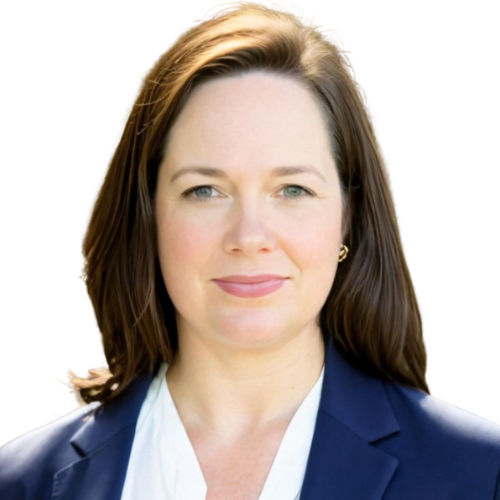Common Questions from Community GI About MASH
Chat with MASLD AI

Hi, I am MASLD AI.
Suggested Questions :

MASLD AI 01:33 AM

In this insightful video, Christie Morrison, a local advanced practice provider with the GHAPP MASLD/MASH Community Network, answers two of the most frequently asked questions from community GI providers: when to refer patients with MASH to a transplant center and how to evaluate liver fibrosis when FibroScan® isn’t accessible. Christy emphasizes the importance of using non-invasive testing (NITs)—including FIB-4 and ELF (Enhanced Liver Fibrosis) scores—to help identify patients with F3 fibrosis, who are at higher risk for rapid progression to cirrhosis and hepatocellular carcinoma (HCC). She encourages early referral to transplant hepatology to avoid delays in care, especially given long wait times and the value of multidisciplinary support teams at transplant centers. For clinicians without access to FibroScan, Christy shares practical alternatives such as ordering reflex testing to ELF via major labs and leveraging easy-to-use digital tools like MDCalc for FIB-4 calculation. This episode is a valuable resource for GI providers looking to optimize liver care pathways and prevent late-stage complications in MASLD and MASH patients.
Related Podcast
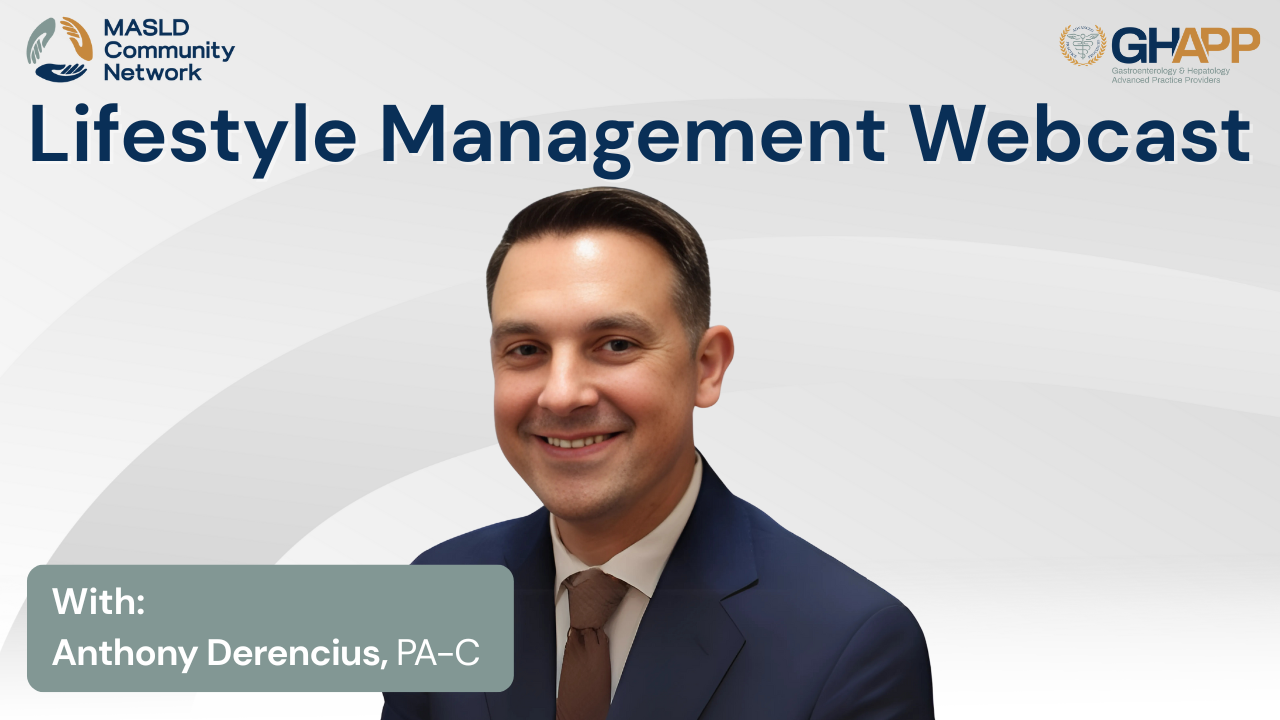
Lifestyle Management With Anthony Derencius

Join Anthony Derencius, PA-C, at Pinnacle Clinical Research, for an in-depth, case-based discussion on the role of lifestyle management in MASH and MASLD. In this educational session from the GHAPP MASLD Community Network, Anthony walks through the real-world case of a 65-year-old patient with obesity, diabetes, and suspected metabolic liver disease, highlighting how to interpret non-invasive diagnostics like FIB-4 scores and transient elastography. He explains the clinical significance of metabolic risk factors, genetic predispositions (such as PNPLA3), and how personalized approaches to nutrition and exercise can alter the progression of fatty liver disease. With evidence-based insights on the Mediterranean diet, aerobic vs resistance training, and behavior change strategies, this video offers frontline strategies to support patients in reversing or slowing fibrosis. Watch to learn how providers can combine patient education, lifestyle interventions, and emerging pharmacotherapy to manage MASLD and MASH more effectively. Educational support provided by Madrigal Pharmaceuticals. For more disease state content, visit the GHAPP MASLD Community Network.
Watch Now
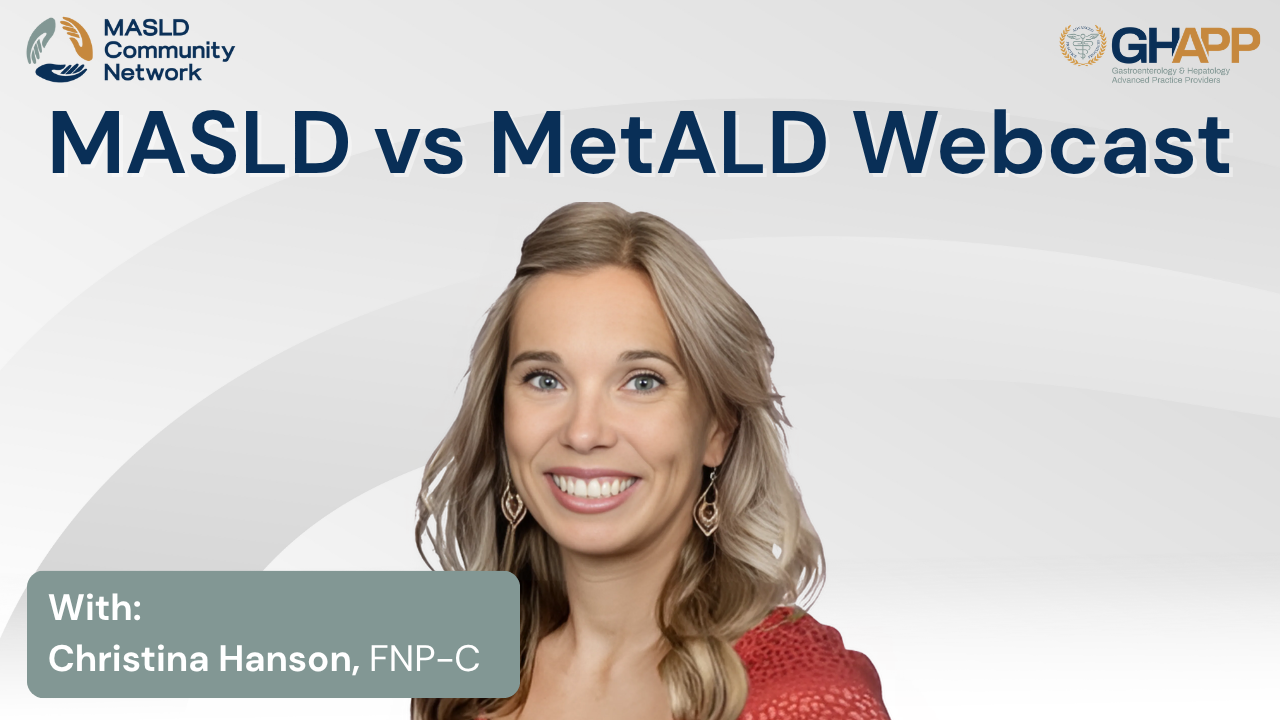
MASLD vs MetALD With Christina Hanson

Discover the latest insights on MASLD and MetALD in this educational session from the GHAPP MASLD Community Network. Christina Hanson, FNP-C, walks through a real-world case study to highlight how common metabolic conditions like hypertension, hyperlipidemia, obesity, and PCOS intersect with alcohol use to drive liver disease progression. The session explores updated nomenclature replacing NAFLD/NASH, the role of FibroScan and elastography in staging fibrosis, and the importance of screening patients with metabolic risk factors for fatty liver. Learn how alcohol consumption contributes to liver injury, triglyceride elevation, and blood pressure changes, and how objective biomarkers such as PEth testing are transforming diagnosis beyond self-reporting. Christina also reviews lifestyle interventions, dietary strategies like the Mediterranean diet, and current treatment considerations for patients with advanced fibrosis (stage 3), including when to initiate HCC screening. Whether you are a hepatologist, GI specialist, or advanced practice provider, this session provides practical tools for evaluating and managing patients with MASLD, MetALD, and related liver health challenges.
Watch Now
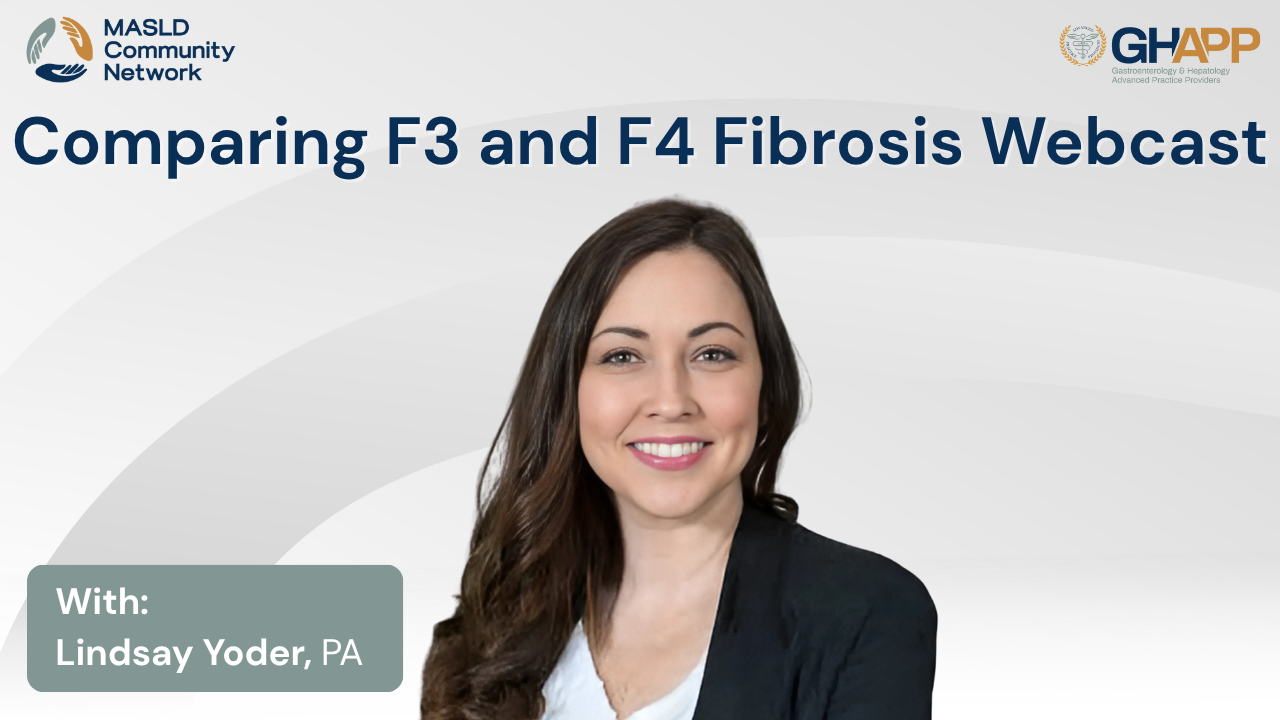
Comparing F3 and F4 Fibrosis With Lindsay Yoder

In this in-depth educational session, Lindsay Yoder, PA from Indiana University in Indianapolis, walks through two detailed case studies to highlight the differences between advanced F3 fibrosis and F4 cirrhosis. Using real-world clinical data—including labs, FibroScan, ELF testing, and imaging—she explains how to stage patients with MASLD/MASH, interpret non-invasive fibrosis assessments, and tailor treatment strategies. Viewers will learn how subtle differences in labs and imaging findings, such as thrombocytopenia and liver stiffness measurement, can shift a patient’s diagnosis from advanced fibrosis to cirrhosis. Lindsay also discusses the role of lifestyle interventions, multidisciplinary management, and therapeutic options like resmetirom and GLP-1s, as well as key monitoring strategies for hepatocellular carcinoma (HCC) surveillance and variceal screening. Whether you’re a hepatology provider, an APP, or a clinician looking to sharpen your skills in managing MASLD/MASH, this case-based discussion provides practical insights you can apply in everyday practice.
Watch Now

NITs: A Practical Overview: Navigating the Basics

Join Ellie Gonyeau, a nurse practitioner at Beth Israel in Boston, for an insightful podcast episode on metabolic dysfunction-associated steatotic liver disease (MASLD) and MASH, and how to effectively use non-invasive testing (NITs) to evaluate and manage patients with fatty liver disease. Ellie breaks down the differences between MASLD and MASH—explaining why distinguishing simple steatosis from inflammatory liver injury matters for long-term outcomes. She covers first-line serum-based tools like FIB-4 and ELF score, as well as imaging-based modalities including FibroScan and MR elastography, helping clinicians understand when and how to apply each test. With practical tips on interpreting fibrosis risk thresholds, stratifying patients with metabolic comorbidities, and educating primary care teams, this episode emphasizes the power of early identification, appropriate triage, and collaborative care to prevent disease progression. Whether you're working in general GI, primary care, or hepatology, this episode equips you with tools to make liver disease detection more proactive and patient-centered.
Watch Now
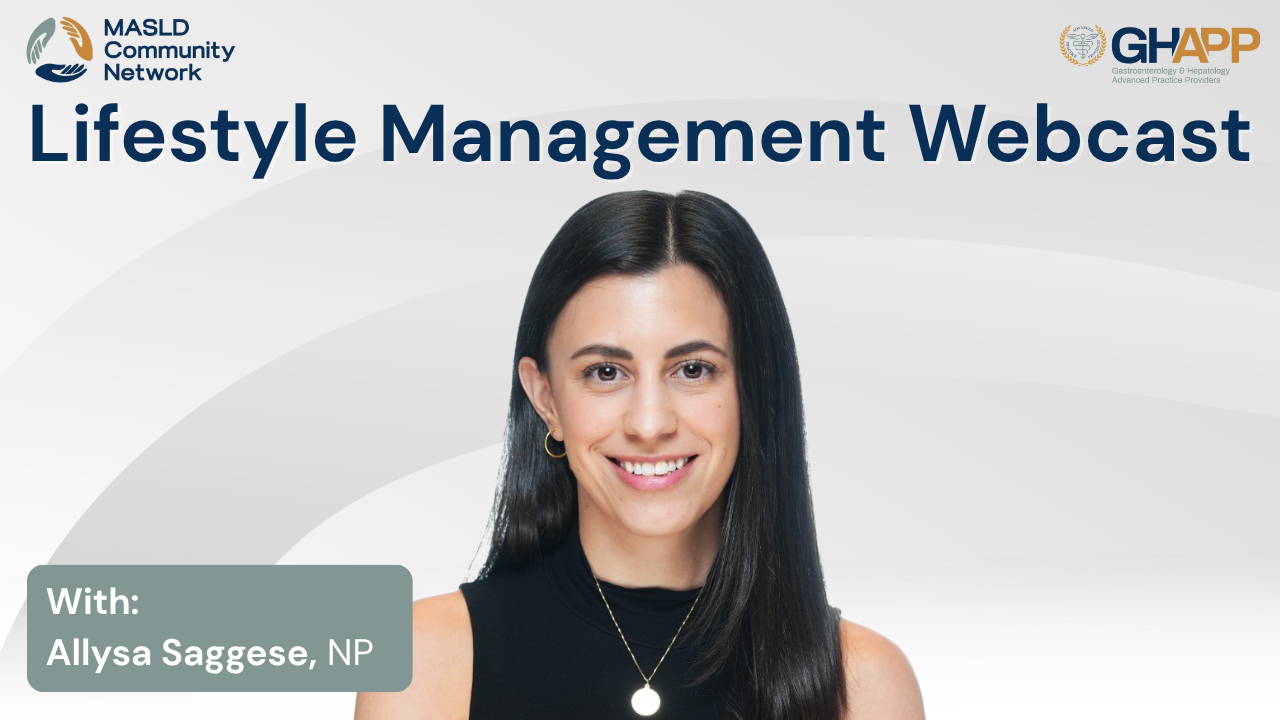
Lifestyle Management With Allysa Saggese

Join Allysa Saggese, NP, from Weill Cornell Medicine in New York City, for an insightful and practical discussion on lifestyle management for MASLD and MASH, presented through the GHAPP MASLD/MASH Community Network, sponsored by Madrigal Pharmaceuticals. In this case-based presentation, Allysa walks viewers through the non-pharmacologic strategies used to manage Metabolic Dysfunction-Associated Steatotic Liver Disease (MASLD), highlighting the role of nutrition, physical activity, and patient-centered counseling. Using a real-world example of a 65-year-old patient with obesity, diabetes, and steatosis, Allysa demonstrates how to assess fibrosis risk through non-invasive testing like FIB-4 and FibroScan, and explains how lifestyle modifications remain central to slowing disease progression—even in the era of advanced therapeutics. The session explores the importance of motivational interviewing, cultural dietary preferences, and how to structure effective, individualized conversations around reducing sugar intake, increasing movement at home, and achieving sustainable 5–10% weight loss to improve liver histology. Allysa also breaks down the metabolic interplay between central adiposity, insulin resistance, and liver inflammation, and shares counseling tips to build patient trust and long-term engagement. Whether you're a GI or hepatology provider, this session delivers real-world guidance to help empower patients to reverse early liver damage through everyday lifestyle changes.
Watch Now

APP Insight: Common Questions from Patients About MASH

In this video, Jonathan Yeh, PA, answers three of the most frequently asked questions about MASH—Metabolic Dysfunction–Associated Steatohepatitis—and offers practical advice for understanding and managing this progressive form of fatty liver disease. He begins by explaining what MASH is: an inflammatory, more advanced stage of MASLD (Metabolic Dysfunction–Associated Steatotic Liver Disease), driven by abnormal fat accumulation in the liver due to impaired fat transport. Jonathan then breaks down the treatment approach, emphasizing the importance of lifestyle modification—particularly diet and exercise. He highlights the benefits of a green Mediterranean diet, regular physical activity, and sustainable weight loss, which can improve or even reverse MASH in many patients. For individuals with more advanced fibrosis, pharmacologic treatment with resmetirom (Rezdiffra) may be indicated. This concise FAQ offers helpful guidance for patients and providers alike on tackling MASH with evidence-based strategies.
Watch Now
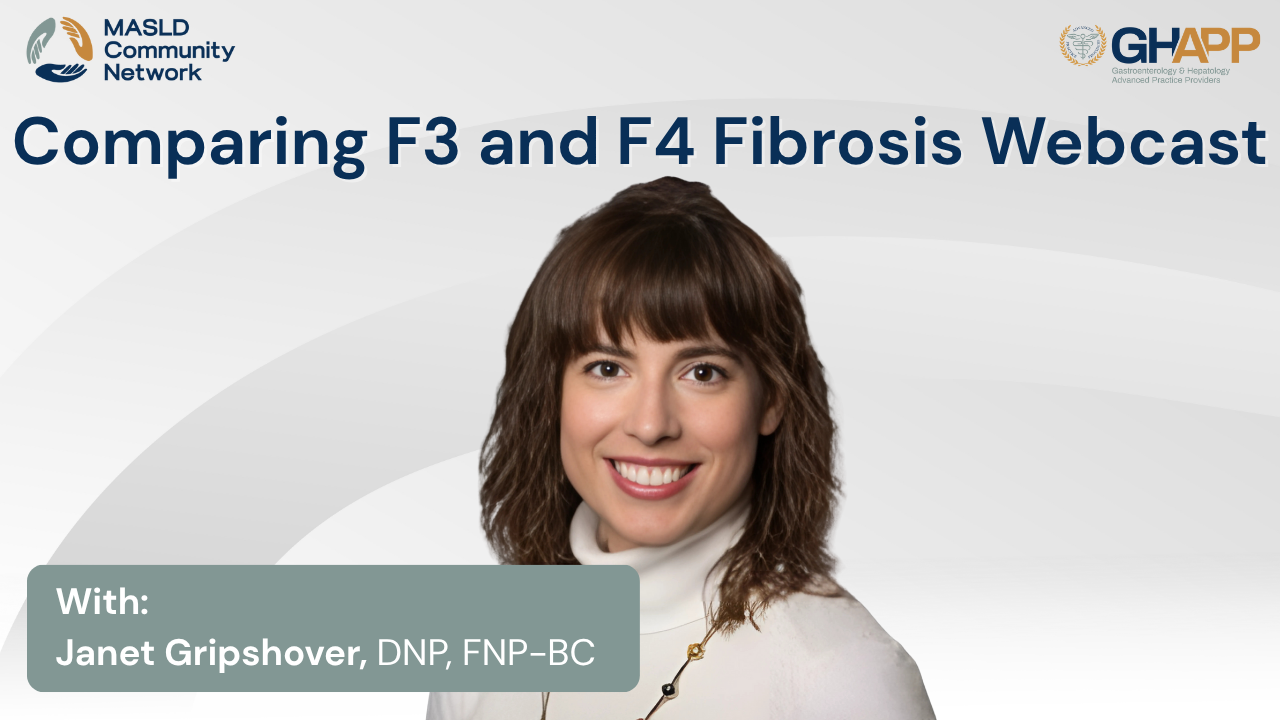
Comparing F3 and F4 Fibrosis With Janet Gripshover

Welcome to the MASLD Community Network, where experts share practical insights on diagnosing and managing metabolic dysfunction–associated steatotic liver disease (MASLD) and metabolic dysfunction–associated steatohepatitis (MASH). In this session, Janet Gripshover, NP and Nurse Manager of the Liver Transplant Program at Cedars-Sinai, explores one of the most challenging aspects of hepatology—distinguishing between F3 fibrosis and F4 cirrhosis. She explains why identifying the transition from bridging fibrosis to cirrhosis is critical for patient outcomes, treatment decisions, and cancer surveillance. Using real-world case discussions, Janet reviews non-invasive diagnostic tools such as FIB-4, transient elastography (FibroScan®), ELF testing, and lab findings, highlighting how concordant results strengthen diagnostic confidence. She also addresses risk factors like obesity, type 2 diabetes, hypertension, and sleep apnea, and emphasizes the role of lifestyle modification, GLP-1 therapies, and new treatments that can reduce fat and fibrosis progression. Importantly, she discusses why cirrhosis shifts management priorities from prevention to preservation and underscores the need for hepatocellular carcinoma (HCC) surveillance. Whether you are a hepatology provider, APP, or clinician looking to better understand the nuances of staging MASLD/MASH, this video provides a comprehensive and practical guide to diagnosing and managing advanced liver fibrosis.
Watch Now
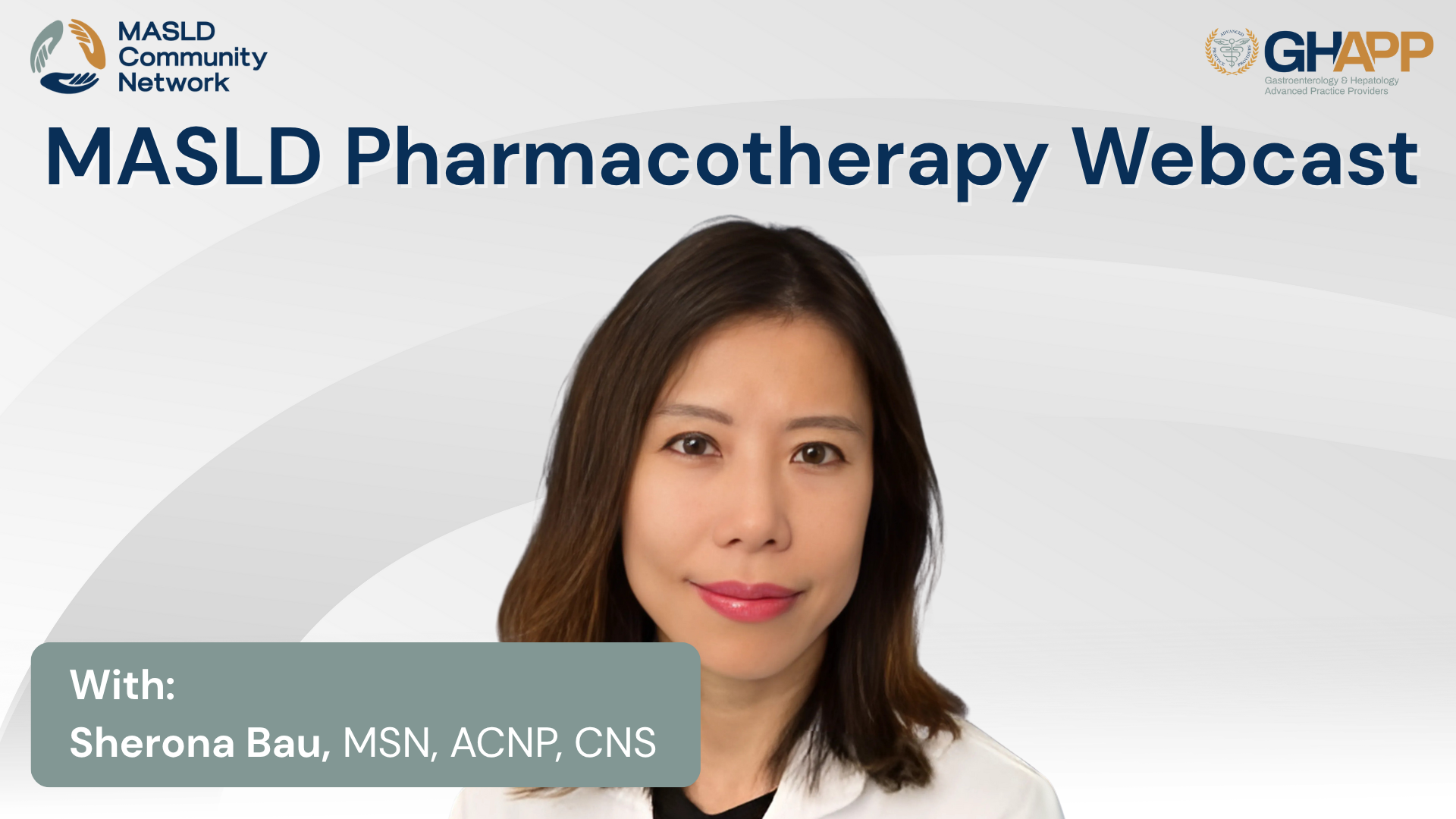
MASLD Pharmacotherapy

In this dynamic and highly informative session, Sherona Bau, NP, presents a comprehensive overview of pharmacotherapy in MASLD and MASH, breaking down current treatment strategies and emerging therapies for patients with metabolic dysfunction-associated steatotic liver disease. This presentation, part of the MASLD/MASH Community Network, begins by contextualizing the recent nomenclature shift from NAFLD/NASH to MASLD/MASH and its clinical implications. Sherona explores lifestyle intervention targets, including Mediterranean diet, weight loss goals based on fibrosis stage, and the role of GLP-1 and GIP receptor agonists in improving liver health. She highlights the ESSENCE trial results for semaglutide, discusses the only FDA-approved therapy to date—resmetirom (Rezdiffra)—and explains its mechanism of action via thyroid hormone receptor beta activation. The session dives deep into efficacy data from the MAESTRO-NASH trial, side effect profiles, drug–drug interactions, and monitoring recommendations. She also previews a pipeline of promising agents in phase 2 and 3 trials—including tirzepatide (GLP-1/GIP), cotadutide (GLP-1/GR), pemvidutide (GLP-1/GIP), and retatrutide (GLP-1/GIP/GR)—offering insight into what’s next in the evolving treatment landscape. This is a must-watch for hepatology and endocrinology clinicians focused on the future of fatty liver management.
Watch Now
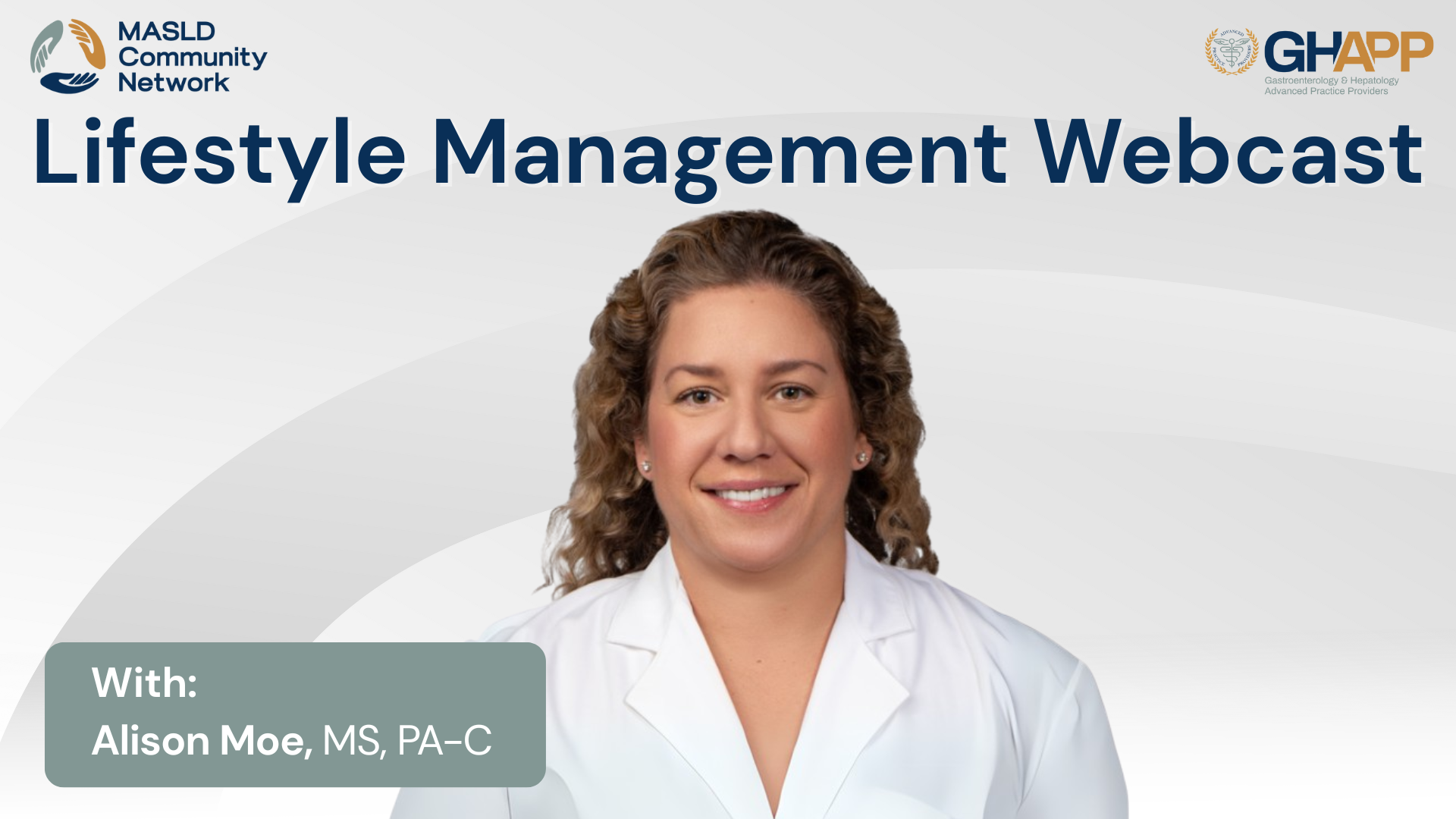
Lifestyle Management With Alison Moe

Join Alison Moe, PA-C, from Atlanta Gastroenterology Associates, as she walks through a real-world clinical case highlighting the challenges and strategies in managing Metabolic Dysfunction-Associated Steatotic Liver Disease (MASLD) and Metabolic Dysfunction-Associated Steatohepatitis (MASH). In this engaging and educational session, Alison shares the case of a 65-year-old Hispanic male with obesity, type 2 diabetes, and fatty liver disease—diving deep into non-invasive diagnostic tools, including FIB-4 scoring and FibroScan, and how these help guide risk stratification for liver fibrosis. The discussion emphasizes the crucial role of dietary counseling, culturally sensitive lifestyle modifications, and exercise guidance to slow or even reverse disease progression. Learn how to set achievable goals for patients and explore effective methods for improving glycemic control, BMI, and overall liver health. Alison also touches on evidence-based interventions such as the Mediterranean diet, resistance training, and intermittent fasting, supported by AASLD and European liver guidelines. Whether you're a clinician treating MASLD or simply interested in the evolving approach to fatty liver disease, this case study offers practical takeaways and guidance to optimize patient outcomes.
Watch Now
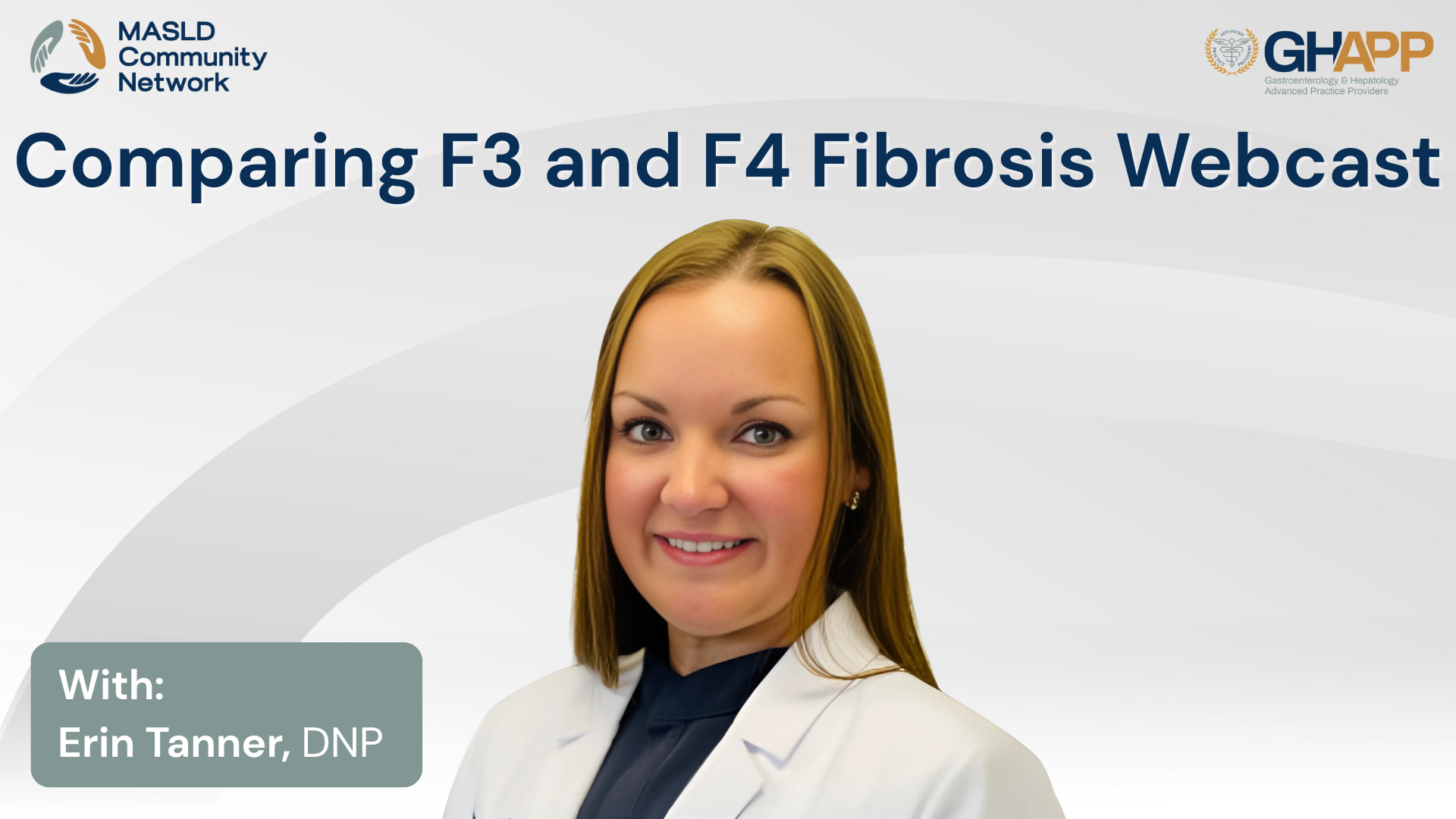
Comparing F3 and F4 Fibrosis With Erin Tanner

Join Erin Tanner, NP from Gastro Health in Birmingham, Alabama, for a practical and in-depth exploration of how to differentiate and manage patients with F3 versus F4 fibrosis in the setting of MASLD (Metabolic Dysfunction-Associated Steatotic Liver Disease) and MASH. This session, part of the MASLD & MASH Community Network, features two detailed case studies—Sam A and Sam B—who share identical comorbidities but diverge in fibrosis stage, illustrating how non-invasive testing (NITs) can guide diagnosis and treatment. Erin walks through the clinical application of tools like FIB-4, FibroScan (VCTE), ELF test, and CAP score, emphasizing the importance of interpreting lab and imaging results in context. The discussion covers key decision points, including when to initiate pharmacologic therapy like resmetirom (Rezdiffra), how to determine eligibility for HCC surveillance, and when to consider liver biopsy. She also addresses common challenges in community GI settings, such as incidental fatty liver findings, elevated ferritin levels, and the limitations of FIB-4 in older or diabetic patients. Whether you're in hepatology, gastroenterology, or primary care, this talk offers actionable insights on fibrosis staging, lifestyle counseling, and long-term monitoring in patients with MASLD and MASH.
Watch Now





 July 2025
July 2025 